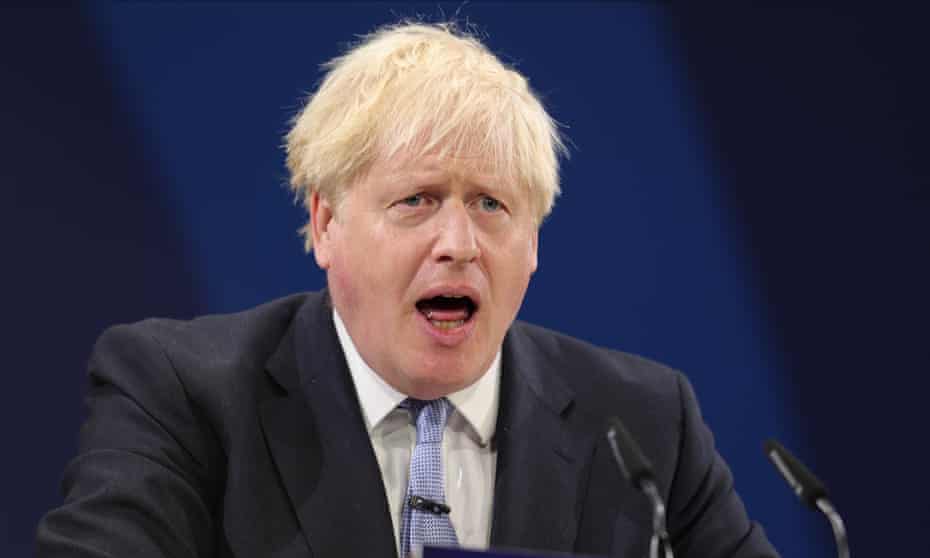Boris Johnson’s climate credibility at stake in run-up to Cop26 summit
Campaigners fear net zero strategy is being hamstrung by Rishi Sunak, who refuses to provide adequate funding

Boris Johnson faces a significant test of his leadership before the Cop26 climate summit as the chancellor and business secretary are at war over the imminent plan for reaching net zero carbon dioxide emissions.
The government is poised to publish its long-awaited net zero strategy on Monday, setting out how the UK will meet its targets to cut CO2 emissions by 78% by 2035 and reach net zero by 2050. This will also include the heat and buildings strategy for insulating draughty homes and phasing out gas boilers, along with a massive expansion of offshore wind, and building electric vehicle charging networks.
But green campaigners are concerned that the strategies, put forward by Kwasi Kwarteng are being hamstrung by opposition from Rishi Sunak, who is refusing to provide adequate funding.
Failure to put forward a viable and well-funded blueprint for reaching net zero would destroy the UK’s credibility at a crucial time, campaigners have said, just weeks before the UN Cop26 climate talks, which begin in Glasgow at the end of this month.
Ed Matthew, campaign director at green thinktank E3G, said: “To achieve an ambitious outcome at Cop26, the government has to lead by example. If they don’t have their own house in order on how to reach net zero, how are they going to persuade the rest of the world to get on track? The whole diplomatic strategy is absolutely dependent on having a credible plan in place in the UK.”
Kwarteng has spoken publicly in favour of decarbonising electricity generation by 2035, and is pushing net zero behind the scenes. This is a new departure for the business secretary, who comes from a strongly free-market viewpoint, as one of the authors of Britannia Unchained. But insiders claim the pandemic has changed his outlook, and that he has undergone elements of a “green” conversion – though he is also still intent on licensing new oil and gas in the North Sea.
“With the pandemic and the energy crisis, he is seeing a need for government intervention,” said one close observer. “Energy security is now a key theme, and building renewables can help with that.”
But Sunak, who controls the purse strings, is understood to be strongly opposed to devoting new cash to the climate effort. He was notably silent on the climate, net zero strategy and Cop26 in his speech to the Tory party conference earlier this month.
“It’s astonishing that he did not mention climate change: the single greatest threat the UK economy is facing, and with Cop26 approaching,” said Matthew. “Without the Treasury, we can’t be on track for net zero, because we need not just the policies but investment – this is the litmus test.”
A government source denied any split and told the Guardian: “This is a whole government approach: every department has signed up to net zero and the prime minister is the biggest proponent of this agenda. The preparation of the strategy with the Treasury has been smooth.”
The Treasury is also due to publish on Monday its own net zero findings, in the form of a review that is expected to set out the costs of reaching net zero. The Treasury net zero review is controversial among green experts, as the Guardian understands it will not take account of the many benefits of cutting emissions, including green jobs, lower energy bills and health improvements from cutting air pollution, as well as reducing the impacts of extreme weather.
“It’s as if the Stern review never happened,” said one expert, referring to the landmark 2006 study by climate economist Nicholas Stern, which found the short-term costs of cutting emissions were far outweighed by the economic benefits. “They have stuck to their old pre-Stern models of cost.”
Green campaigners believe the Treasury review will be seized on by climate sceptics in the Tory ranks. They are also concerned that lobbying by the fossil fuel industry has persuaded the government to make hydrogen a leading part of its net zero strategy. That would be a mistake, they argue, as some forms of hydrogen are not low-CO2, but require fossil fuels to be converted into hydrogen and the resulting CO2 stored, in contrast with genuine green hydrogen methods, by which hydrogen is manufactured using renewable energy.
“Hydrogen boilers are greenwash,” said Matthew. “They will massively increase energy bills. If they’re considering hydrogen, that’s a bad sign.”
Kat Kramer, global climate lead at the charity Christian Aid, said: “The government is currently promoting false solutions that effectively subsidise the fossil fuel industry. It is crazy that they plan to use taxpayers’ money to promote hydrogen made from fossil gas rather than renewables, and for capturing carbon from burned fossil fuels and storing it underground.”
A Treasury spokesperson said: “We are absolutely committed to meeting our world-leading climate commitments and the prime minister’s 10-point plan set out GBP12bn of investment for green industries. “
But they stressed the importance of private sector investment, adding: “Government alone cannot achieve net zero, which is why we are working with the private sector to boost investment and leading the world in green finance.”
